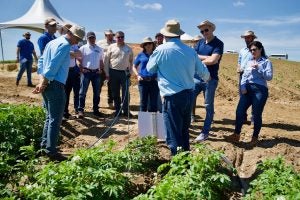A Fortune 500 company fighting for farmers and the entire agricultural industry is rare when so many seem to be looking to defame and degrade agriculture. However, becoming an ally to ag is exactly what PepsiCo is striving to do at a regional and individual level with its demonstration farms.
The program, which originated in India, now has roughly 200 demonstration farms globally, including in the United States. Christine Daugherty, vice president of sustainable agriculture and responsible sourcing at PepsiCo, says the farms are a way to work directly with farmers to solve issues they are facing and to provide customers with more sustainable products.
“We work with farmers on how we can help with water stewardship, water management, technological improvements, or innovative soil practices,” said Daugherty. The company is invested in sourcing their raw products sustainably and they believe providing educational opportunities for farmers will help them accomplish that goal.
The demonstration farm topics range from personal protection equipment to drones to water stewardship and satellite imaging. The topics depend on the location and needs of the region. In developing nations more fundamental information such as protection equipment, fertilizer application, or chemicals are demonstrated. In the more developed countries, the demonstration farms focus on drones, satellite imagery, or water stewardship such as drip irrigation.
“Our mindset is global impact, locally relevant. We want to work with our farmers on good water stewardship, soil health, sustainable agriculture practices,” Daugherty said. “However, we have to be sure that the technologies we bring them are relevant to their capability, their community and their financial ability to implement.”

Alternative irrigation practices have been successfully showcased at the demonstration farms and implemented across the region. Drip or sprinkler irrigation has shown the ability to reduce water usage by 20 to 30 percent, which drastically improves water stewardship. In Iowa and Illinois cover crop utilization and alternative tillage has decreased fertilizer usage by a quarter to a third as the soil becomes healthier. This is a two-fold win because it helps the farmers on cost, but it also provides customers with a more environmentally friendly product.
Drones and satellite imagery are technologies that are becoming more attainable in agriculture, but seeing the benefits versus the cost can be difficult. Demonstration farms in the United States are working to showcase, first-hand, the benefits of usage of these technologies. Drones can be utilized for pest control and localized pesticide application. Satellite imagery can be used to determine canopy cover. In an effort to meet farmers where they are, though, the demonstration farms also explore simpler technologies, such as smart phone applications that can have companies make treatment recommendations based on an uploaded picture.
PepsiCo looks for well-respected, progressive farmers willing to dedicate a small portion of their farm to a test plot. The company then brings in providers who will assist with specific needs in that geographic area. The rest of the farm will serve as a control and keep the same growing practices as previously utilized. The farm is opened up to the public two or three times during the growing cycle for the community to visit. PepsiCo has found that peer-to-peer learning through demonstration is effective in the agriculture industry because farmers are able to see the business value of changing their practices.
The demonstration farms are pre-competitive — this means the farm and results are available to other farmers in the community whether they farm for PepsiCo or not.
“We want them to see things they might be able to take back to their farm and implement, whether it is simple or sophisticated,” Daugherty said. “If individual farmers become better, then the industry as a whole becomes better.”
The demonstration farms are part of PepsiCo’s Next Generation Agriculture program. The work being done by the company and farmers today will hopefully benefit farmers and the industry in the future. The goal on the PepsiCo website is to “advance environmental, social and economic benefits to communities around the world by supporting practices and technologies that promote improved farmer livelihoods and agricultural resiliency.”
With goals for sustainability in 2020 and beyond, focusing on individual regions and individual farmers may seem counterintuitive. However PepsiCo sees it as an opportunity to use its size and resources to influence the agriculture industry positively.
“There’s a lot of challenges out there, we at PepsiCo want to be part of the solution,” said Daugherty. Our breadth and global reach mean we can work collaboratively with farmers, communities and NGOs to make a difference.”
Michelle Bufkin is a freelance communication specialist whose goal is to help producers bridge the farm-to-plate knowledge gap that exists with consumers today. She uses her full-time position as the Membership and Communication Director at the Arkansas Cattlemen’s Association to interact with producers and work on building that connection.



